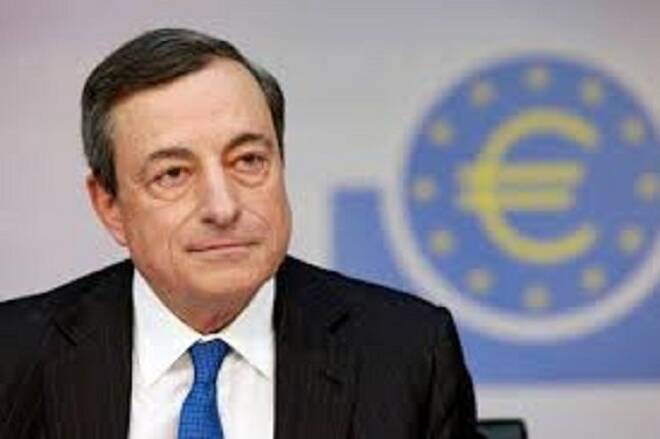Advertisement
Advertisement
Draghi Fails to Talk Down Euro; Says ECB Will Decide on Tapering this Autumn
By:
The Euro/Dollar rose last week amid European Central Bank indications a decision on tapering stimulus is likely in October. The ECB also kept rates at
The Euro/Dollar rose last week amid European Central Bank indications a decision on tapering stimulus is likely in October. The ECB also kept rates at record lows and confirmed that asset purchases would continue at least until December.
The EUR/USD settled the week at 1.2034, up 0.0173 or +1.46%.
ECB President Mario Draghi attempted to talk the currency lower, but traders may have read this as a vote of confidence in economic growth. Draghi said the ECB must take into account the weakening of inflation due to the strong Euro as it prepares to wind down its unprecedented stimulus program.
Draghi also reiterated an early stance, saying that policymakers would decide on tapering this autumn, adding: “Probably the bulk of these decisions will be taken in October.”
Japanese Yen
The Dollar/Yen fell more than 2.0 percent against the safe-haven Japanese Yen after U.S. and German government bond yields declined on the back of the ECB decision to keep rates at record lows.
The USD/JPY settled the week at 107.837, down -2.399 or -2.18%.
At the start of the week, the Japanese Yen posted a strong rally on safe-haven buying related to North Korea’s test of a nuclear weapon. The price action seemed to revolve around this theme all week.
The USD/JPY was also pressured as traders grew uncomfortable with the outlook for U.S. fiscal policy once a three-month extension to the to the U.S. debt limit that U.S. President Donald Trump said he agreed to on September 6 expires.
Australian Dollar
The Australian Dollar finished higher against the U.S. Dollar last week as investors focused on lower U.S. interest rates and strong appetite for risk.
Early in the week, he Reserve Bank of Australia left its benchmark cash rate unchanged at a record low 1.5% at a policy meeting on September 5, balancing optimism around employment growth over caution around flat wages growth and a higher local currency.
The RBA’s decision to keep rates on-hold was the 13th-consecutive month that the Reserve Bank of Australia has kept interest rate steady. It also signaled it remains confident the economy will slowly gather momentum over the next year.
“The higher exchange rate is expected to contribute to the subdued price pressures in the economy,” said Governor Philip Lowe in an accompanying statement.
“An appreciating exchange rate would be expected to result in a slower pick-up in economic activity and inflation than currently forecast,” he added.
In other news, Australia’s quarterly economic growth rate more than doubled last quarter, but half the expansion was due to increased consumer spending, which itself was based on a potentially unsustainable drop in the savings rate.
Australia’s economy grew 0.8 percent in the three months to June, and 1.8 percent over the past year, according to the official gross domestic product numbers from the Bureau of Statistics.
About the Author
James Hyerczykauthor
James Hyerczyk is a U.S. based seasoned technical analyst and educator with over 40 years of experience in market analysis and trading, specializing in chart patterns and price movement. He is the author of two books on technical analysis and has a background in both futures and stock markets.
Advertisement
